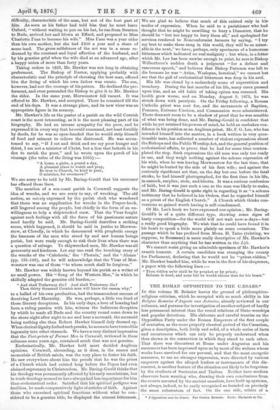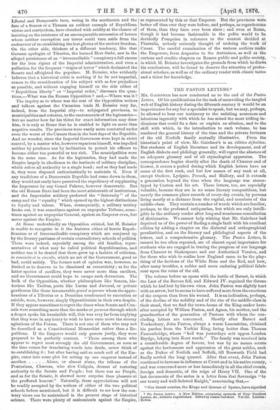THE ROMAN OPPOSITION TO THE CIESARS.*
IN this volume M. Boissier leaves the ground of philosophiccr- religious criticism, which he occupied with so much ability in his Religion Romaine d'Auguste aux Antonin:, already reviewed in our columns, and pursues the investigation of another subject of hardly less permanent interest than the vexed relations of State-worships and popular devotions. His elaborate and careful treatise on the Opposition Party under the Roman Emperors of the first couple of centuries, as the more properly classical period of the Cce,sariam,. gives a description, both lively and solid, of a whole series of facts and occurrences which can only be properly understood when thus shown in the connection in which they stand to each other. That there was discontent at Rome under Augustus and his- - successors has been impressed upon us by most of the writers whose works have survived for our perusal, and that the most energetic measures, to use no stronger expression, were directed by various emperors against the alleged leaders or instruments of this dis- content, is another feature of the situation not likely to be forgotten. by the students of Suetonius and Tacittm Neither have modern observers been wanting who, drawing their own conclusions from the events narrated by the ancient annalists, have built up systems, not always, indeed, to be easily recognised as founded on precisely the same substratum of fact. On the one side, critics of a • r Opposition seas la Chars. Par Gaston Bolinger. Paris: Hachette Si 01e..
Metal and Democratic turn, seeing in the sentiments and the fate of a Seneca or a Tbrasea an evident example of Republican virtue and martyrdom, have clutched with avidity at the chance of insisting on the existence of an unconquerable succession of heroes whom neither corruption nor terror could turn aside from the endeavour of re-establishing the lost glories of the ancient freedom. On the other side, thinkers of a different tendency, like that German apologist of Tiberius, the learned Herr Stahr, saw in the alleged persistence of an " irreconciliable " conspiracy a full excuse for the iron rigour of the Imperial administration, and even a palliation for the frequent "reigns of tenor" which decimated the senate and affrighted the populace. M. Boissier, who evidently believes that a historical critic is nothing if he be not impartial, comes to the consideration of his subject with as few prejudices possible, and without engaging himself on the side either of "Republican liberty" or "Imperial order," discusses the ques- tions,—What was the Roman Opposition ? and,—Where was it?
The inquiry as to where was the seat of the Opposition writers and -talkers against the Ctesarism leads M. Bonnier very far, indeed, from the Imperial city—to subjugated provinces, to municipalities and colonies, to the cantonments of the legionaries— but no matter how far his thirst for exact information may draw him, it is only at Rome that he is enabled to light on more than 'negative results. The provinces were vastly more contented under even the worst of the Cnsars than in the best days of the Republic. And no wonder, since the Imperial Governors were kept in strict control, by a master who, however rapacious himself, was impelled neither by prudence nor by inclination to permit his officers to become either too powerful or too rich. The municipalities were in the same case. As for the legionaries, they had made the Empire largely in obedience to the instincts of military discipline, which refers all authority to a single head ; and as they had made it, they were disposed enthusiastically to maintain it. Even if any traditions of a Democratic Republic had come down to them, they would not easily have perceived the expediency of supplanting the Imperator by any Grand Palaver, however democratic. But the old Roman State had been the most aristocratic of institutions, and the Imperialist soldiery preferred the " fraternity " of the camp and the " equality " which opened up the highest distinctions to loyalty and valour. When, consequently, a military mutiny broke out, it was sometimes against an unpopular Tribune, some- times against an unpopular General, against an Emperor even, but never against the Empire.
At Rome undoubtedly an Opposition existed, but M. Boissier is unable to recognise in it the features either of heroic Repub- licanism or of Irreconcileable conspiracy which are conjured up by the literary partisans of certain contradictory schools of politics. There were indeed, especially among the old families, repre- sentatives of what may be called political Republicanism, and neither can it be denied that there grew up a fashion of criticism, in convioiis et in eirculis, which no act of the Government, good or bad, could satisfy. The former sort of opinion was, however, so limited as to deserve to be dismissed as eccentricity ; as for the latter species of cavillers, they were never more than cavillers, and no Government could hope to escape such detractors. The bulk of the Opposition, whether philosophers like Seneca, his- torians like Tacitus, poets like Lucan and Juvenal, or private gentlemen like those innumerable grand seigneurs whom the appre- hensions of a Tiberius or a Domitian condemned to execution or suicide, were, however, simply Oppositioniste in their own despite. If they appear sometimes toregret the times when Senate and Con- suls were something more than the masks oi persons through which a despot spoke his irresistible will, this was very far from implying that they were in any hurry to wish to have once more the stormy agitations of the Forum. There is not one of them who may not be described as a Constitutional Monarchist rather than a Re- publican. If the Emperor would only govern justly, they were prepared to be perfectly content. "Those among them who appear to regret most strongly the old Government, as soon as the tune comes for translating words into deeds, never think of re-establishing it ; but after having said so much evil of the Em- pire, enter into some plot for setting up one emperor instead of
another Alone, or almost alone, the tribune of the Pnetorians, Chmreas, who slew Caligula, dreamt of restoring authority to the Senate and People ; but there was no People, and as for the Senate, it showed more surprise than pleasure at the proffered honour." Naturally, these appreciations will not be readily accepted by the writers of either of the two political schools before mentioned, but it is difficult to see how the con- trary views can be maintained in the present stage of historical science. There were plenty of malcontents against the Empire,
as represented by this or that Emperor. But the provinces were better off than ever they were before, and perhaps, as regards some of them, than they have ever been since ; and even at Rome, though it had become fashionable in the polite world to be decidedly Pompeian in reference to the contest decided at Pharsalia, nobody seriously thought of undoing the work of Cxsar. The careful examination of the various authors under the Emperors, from Augustus to the Ant,onines, as well as the curious and erudite chapters on Roman public and polite society, in which M. Boissier investigates the grounds from which he draws his conclusions, will be found to deserve the attention of profes- sional scholars, as well as of the ordinary reader with classic tastes and a thirst for knowledge.



































 Previous page
Previous page